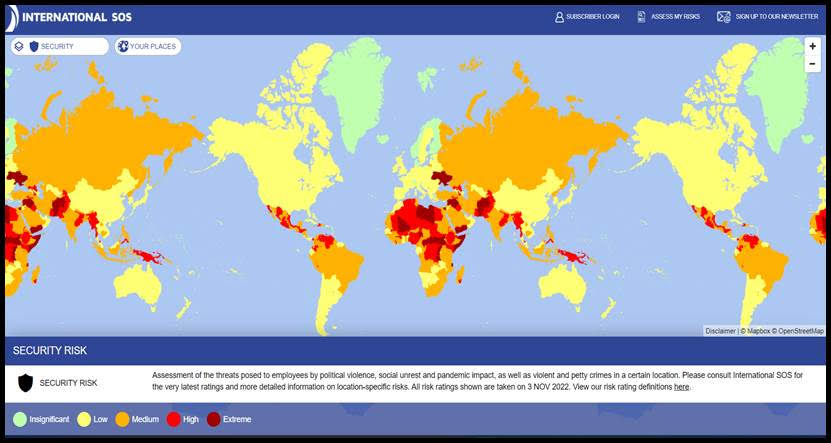
International SOS is releasing its annual interactive Risk Map 2023, designed to help organisations and their mobile workers better understand the risk level of each country around the world.
With the ongoing impact of COVID-19 and the security conflict in Ukraine, the risk map provides invaluable information to enable organisations to recognise and understand the specific ways these risks may impact their employees. As global risks continue to evolve around the world, using data-driven tools like the Risk Map can help organisations maintain their Duty of Care responsibilities in these often-uncertain times.
Using data from the maps, the following countries could potentially be the most dangerous to visit in 2023:
- Afghanistan
- Syria
- Ukraine
- Mali
- Iraq
Many of these countries were also considered the most dangerous in 2022, but it is particularly notable that Ukraine is now ranked as Extreme for security risk considering it was ranked lower, at Medium, before this year’s military crisis began.
Using data from the maps, the following countries may be safe bets to travel to in the coming months:
- Norway
- Finland
- Switzerland
- Denmark
- Iceland
Many of these countries have maintained a calm and safe security environment, as almost all of them were also considered to have an Insignificant level of security risk last year.
The map provides a layer illustrating mental health illness globally using external data from the Institute for Health Metrics and Evaluation, Global Burden of Disease. It shows the estimated percentage of a location’s population suffering from mental health disorders. This allows organisations, particularly large multinationals, to understand which locations may be particularly vulnerable to mental health issues. This data reveals the extent of the mental health epidemic that employees are facing and that employers must mitigate. Estimates are that around 14% (1-in-7) of people across the world are currently experiencing one or more mental or substance use disorders.
Dr Irene Lai, Medical Director at International SOS comments, “With travel and health risks on the rise in many regions, it is important for organisations to also focus on mitigating the ongoing impact of mental health issues. Although other acute medical issues which may have a significant impact regularly arise, mental health problems remain in the background and cannot be overlooked. Organisations must handle multiple physical and mental health issues to effectively maintain their Duty of Care responsibilities.
“Organisations could look to use all the tools they have at their disposal to make this challenge more manageable. For instance, the detail provided by the Risk Map can help decision-makers better protect their staff, gauging which locations are challenged with access to medical care, or are particularly vulnerable to mental health issues.”
k travel.




















